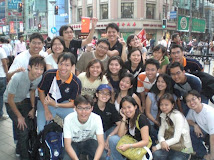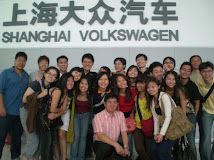逛了一天人民大学的校舍(放风筝、参观人大的“世纪馆”、“校史馆”、“博物馆”、“明德堂”和“法学图书馆” (若没记错的话,分别是人大的体育馆、人大建校历史的展览馆、中国原始至清朝出土文物的展览馆、大讲堂和法法律系的图书馆),其实我那天已经挺累了,坐在“明德堂”里时,有那么舒服的座位和冷气,我都不想动了,哈。
但听说就在我们参观人大的那天是一场辩论大决塞,也有一出学生所办的舞台剧,怎么也得去看看。机会是偶然的。就那么巧,就在我们在人大逗留的那么仅仅一天。也很感谢人大的同学们很愿意地带我们去。[我是去看舞台剧,听说辩论塞也很精彩,可以问Wenqi等人=)]
《楼ooo梯的故事》,(“楼”字要拉长 ‘ou’音来念,哈,当时剧前的介绍者真是这么念的。),讲述的是住同一个小社区的几家人之间的关系。背景应该是二、三十年代的欧洲。男女主角分别住地层及楼上。年轻时,他们相恋,但时过境迁后,他们最终嫁、娶的却不是对方,而是剧中的另两位角色。原因是男主角太一事无成,而当时暗恋女主角的人物(过后是她丈夫)比男主角更稳重、真诚。结果是这两对夫妻之间有了芥蒂。有尤其是在男女主角坦言嫁娶的不是真正所爱后, 两家的隔阂更深了。天意弄人,他们的子女竟然爱上对方。是要为他们父母再续这段缘分吗?还是又一次的错误?这楼梯好像没止尽。
老实说,我不是很喜欢《楼梯》的结居。似乎太仓促了,也有些简化了之前所制造的冲突。我起初以为女主角嫁给了一个更爱她、更有责任感的人,是明智之举,必定比嫁给男主角会来的幸福。但看到他们四人之后的冲突、后悔与埋怨,难道嫁个自己所爱,却无法给予保障的人会幸福吗?爱与被爱,当只能二选一时,你会选哪个?我只是为那一直付出的丈夫感到有点难过。造孽。人事的变迁往往是当事人无法控制的。很无奈。
不过,我还是很享受这舞台剧。《楼梯》的全程制作,从策划到表演,都是学生一手包办的。演员们都是即将毕业的同学,可以说是他们在校的最后一次演出,所以意义重大。在那陈旧的礼堂里,旧式的lecture-style木椅,又长又沉甸甸的灰色落地窗帘,给人一种很old-school的感觉。那盏旧式的街灯、旧式的脚车(人大的同学还真是神通广大)、服装、至他们的精彩演出(是真枪实弹:真的火柴,是那种非安全,在任何粗面一划就着的火柴;真香烟;真抽)还真怕会把礼堂给烧了(哈,可能是我新加坡的想法吧,大惊小怪)。很令人难忘。我仿佛被带到了六、七十年代的学生生活。
再来,演员的演技都很精湛。女主角丈夫的妈够泼辣,她哥够窝囊,男主角的儿子够(小孩子得)令人讨厌。当然还有女主角婉顺,让人怜惜。最令人吃惊的是,男主角的真实身份是个女的!我们当观众的都混然不知。直到策划同学致谢时,我们才恍然大悟。
这次在人大看话剧让我大开眼界。很感谢带我们去的人大同学(丛林,不知写得对吗?)。下次有机会,我要去看辩论塞案=D!
中国情 - Tan Wenqi
对于一个每天清晨起来都得喝杯咖啡的我来说,两周的中国之旅,差点就要了我的命。 因为中国没有我所谓的咖啡。犹记第十一天行程在上海旅馆里看到一壶咖啡时,几进雀跃万分因为已有好些时日没喝着了,然而雀跃的心情很快就蒸发了,因为喝过以后才发现它更似咖啡口味的中国茶。虽然这是在这旅途中一个小小的不方便,但它体现出的确是一种隔阂。身为华人的我虽然在外表和语言上都和正统的中国人一般,但是在某些生活习惯上却和它们有着相当的不同,就连早晨的饮料我也偏向西方的咖啡而不是那一杯杯令人神怡的中国茶。可见虽然根还是一样的,然而由于时间分隔之长久,地理位置距离之遥远和政治体制分别之巨大,同样的一种人也会慢慢演变成似两种有着不同习惯,不同情操的族群。
除了感受到两个国之间相近相远之处以外,我身为一个政治科学的学生也体会到了许多在课本中谈及的中国发展成就和问题。到了繁荣的上海,目睹了"宝钢制钢厂"的庞大规模和"大众汽车厂"的先进技术,我不禁咋舌于中国自改革开放以来的巨大改变,也再次肯定了在当今国际社会自由经济为一个国家所能带来的富裕和民生所能带来的改善。不过,此行一游三个省份,也同时让我们体会到中国土地之辽阔与管辖之困难。感觉上不同地区发展得不太均匀,北京虽是政权的中央,然而比起上海的经济步伐仍然略显缓慢。不过这也可能是政府为了要保留北京这个文化古城和政治中心的缘故,而并没有积极开发,建起摩天大楼的关系。相比之下,山东济南给人的感觉便是一个刚刚开始发展的地带,不过从导游口中和山大教授的演讲中,我们也得知济南的IT业和农林牧副渔业发展得相当可观。即便现在发展还不太均匀但照目前情况来看,整个国家的全面发展也是指日可待的事了。
最后,这次行程最大的收获便是那一份份真挚的友谊。虽说中新交流已画上了一个十分完美的休止符,然而一篇篇崭新的篇章也在尾声中徐徐地被掀开,仔细地在记载着可能是一生友谊的点滴。。。
除了感受到两个国之间相近相远之处以外,我身为一个政治科学的学生也体会到了许多在课本中谈及的中国发展成就和问题。到了繁荣的上海,目睹了"宝钢制钢厂"的庞大规模和"大众汽车厂"的先进技术,我不禁咋舌于中国自改革开放以来的巨大改变,也再次肯定了在当今国际社会自由经济为一个国家所能带来的富裕和民生所能带来的改善。不过,此行一游三个省份,也同时让我们体会到中国土地之辽阔与管辖之困难。感觉上不同地区发展得不太均匀,北京虽是政权的中央,然而比起上海的经济步伐仍然略显缓慢。不过这也可能是政府为了要保留北京这个文化古城和政治中心的缘故,而并没有积极开发,建起摩天大楼的关系。相比之下,山东济南给人的感觉便是一个刚刚开始发展的地带,不过从导游口中和山大教授的演讲中,我们也得知济南的IT业和农林牧副渔业发展得相当可观。即便现在发展还不太均匀但照目前情况来看,整个国家的全面发展也是指日可待的事了。
最后,这次行程最大的收获便是那一份份真挚的友谊。虽说中新交流已画上了一个十分完美的休止符,然而一篇篇崭新的篇章也在尾声中徐徐地被掀开,仔细地在记载着可能是一生友谊的点滴。。。
Visit to Universities in Beijing - Shane Yan
The China leg of the Sino-Sing exchange began with our visit to Peking University affectionately known as ‘yi ta hu tu’ or ‘一塌糊涂’ by students from 北大. The reason for the name is because the university is known for its ‘ta3’ (塔)or pagoda, its ‘tu2’ (图) or library and its ‘hu2’ (湖)or lake. Taking a tour around the school, we were mesmerized by the presence of such beauty that lay within the premises of the university. As we walked along the lake (未名湖), we were also told that this was the very place which inspired many literary works and it would be highly possible that any one of the older gentlemen by the lake is a pronounced poet. Such culture, heritage and beauty…many of us commented that if we had this in our school, it would definitely be one of the best chill out place be it to hang out with friends or to sit under a tree to study. But of course, when one considers the weather that Singapore has, such a thought would need much reconsideration.
Unlike our visit to Peking University, we had the luxury of time at Ren Ming University. The most memorable of the visit to the school was the kite flying activity held at the stadium. As many of us had not flown a kite before, we were filled with excitement. Within a few minutes of presenting us with the beautiful kites, students could be seen running across the field in all directions trying to get their kites into the air. After many desperate attempts at trying to get our kite into the air, Darren and I gave up and went to join others (who had also failed in getting their kites up into the air) in chatek which was short-lived because we soon grew interested in the taiji class that was happening on the track. To the embarrassment of the teacher in charge who suddenly found that there were over 10 pairs of foreign eyes watching him, we spontaneously stood at the back of the class and made fools of ourselves trying to follow the teacher’s actions or the actions of the Chinese students in front of us. The lesson was very interesting and it made me realize why such a sport, as with other things like tradition, is kept burning brightly in China while it is in danger of extinction in Singapore. In Singapore where physical exercise (PE) lessons are about running or playing ball games of some sort, taiji is seen as an exercise for elderly people and it would not have crossed our minds as plausible for students to be learning it in school. Pondering on it, I think teaching students taiji would certainly give them a headstart and provide them with an activity to occupy themselves in future. Ostensibly, what goes into a curriculum is very important for inculcating or preserving values or skills in people.
Anyway, back to kite-flying. We finally realized that it wasn’t that we were horrible and kite flying but rather, it was because the kite we had originally was faulty and could not fly. Borrowing another group’s kite before we packed up to move on to our next activity, we took less than a few seconds to get our kite soaring in the air. It was an achievement.
Something else that really impressed me that day was the quality of the acting skills of the graduating students. We had the opportunity to catch a drama performance; ‘Staircase’ by a group of graduating students who came from all fields of life but had a common interest in acting. Although the script was passé, the acting was fabulous and was much better than any of the university productions I have ever seen back in Singapore. The facial expressions, the emotions, the confidence, the intonations…the entire package was a show worth remembering. Perhaps it was because of the language that made the performance even more heartwarming. After spending time in China, I have grown to love the language and realize that there are things that when said in Chinese, sounds a whole lot nicer, more sincere and harmless than when it is expressed in English. It also creates a more intimate feeling between people.
China, with its rich heritage, culture, scenery, language and of course the many friends made, you really cannot help but fall in love with it.
Unlike our visit to Peking University, we had the luxury of time at Ren Ming University. The most memorable of the visit to the school was the kite flying activity held at the stadium. As many of us had not flown a kite before, we were filled with excitement. Within a few minutes of presenting us with the beautiful kites, students could be seen running across the field in all directions trying to get their kites into the air. After many desperate attempts at trying to get our kite into the air, Darren and I gave up and went to join others (who had also failed in getting their kites up into the air) in chatek which was short-lived because we soon grew interested in the taiji class that was happening on the track. To the embarrassment of the teacher in charge who suddenly found that there were over 10 pairs of foreign eyes watching him, we spontaneously stood at the back of the class and made fools of ourselves trying to follow the teacher’s actions or the actions of the Chinese students in front of us. The lesson was very interesting and it made me realize why such a sport, as with other things like tradition, is kept burning brightly in China while it is in danger of extinction in Singapore. In Singapore where physical exercise (PE) lessons are about running or playing ball games of some sort, taiji is seen as an exercise for elderly people and it would not have crossed our minds as plausible for students to be learning it in school. Pondering on it, I think teaching students taiji would certainly give them a headstart and provide them with an activity to occupy themselves in future. Ostensibly, what goes into a curriculum is very important for inculcating or preserving values or skills in people.
Anyway, back to kite-flying. We finally realized that it wasn’t that we were horrible and kite flying but rather, it was because the kite we had originally was faulty and could not fly. Borrowing another group’s kite before we packed up to move on to our next activity, we took less than a few seconds to get our kite soaring in the air. It was an achievement.
Something else that really impressed me that day was the quality of the acting skills of the graduating students. We had the opportunity to catch a drama performance; ‘Staircase’ by a group of graduating students who came from all fields of life but had a common interest in acting. Although the script was passé, the acting was fabulous and was much better than any of the university productions I have ever seen back in Singapore. The facial expressions, the emotions, the confidence, the intonations…the entire package was a show worth remembering. Perhaps it was because of the language that made the performance even more heartwarming. After spending time in China, I have grown to love the language and realize that there are things that when said in Chinese, sounds a whole lot nicer, more sincere and harmless than when it is expressed in English. It also creates a more intimate feeling between people.
China, with its rich heritage, culture, scenery, language and of course the many friends made, you really cannot help but fall in love with it.
小叙中国两周...--- 林建裕
仅仅半个月前, 还依稀记得我们兴奋不已地踏上了为期两周的中国之旅。岂知只一瞬间,长达两周的旅程已告一段落了。俗话说:“读万卷书不如行万里路,” 相信每一位同学都无疑获益良多,不虚此行。与此同时,如陈教授所言,此行本着三大前提: 一,亲睹中国的经济文化发展,体会古老文化;二,亲历人民生活习俗,传统文化;三,促进彼此的来往与了解。
此趟行程事迹多不胜数,恐怕三天三夜也说不完。可是有一点是可以肯定的。中国同学的热情款待不在话下;尽管学业繁忙,几位同学还是抽出时间,不计劳苦地充当导游,介绍当地小吃、观光等,让我们不胜感激。
在短暂的日子里,我们一起探访了三大城市、四所大学;北京大学、人民大学、山东大学与交通大学。在北京,我们参观了古色古香的历史古迹,例如鼎鼎有名的故宫博物院、颐和园、北海公园等,当然不忘了“不到长城非好汉”的万里长城。整个城市都因为2008北京奥运会的来临而感染了气气氛。更难能可贵的是我们不仅参观了北大美不胜收的校园,也受人大同学的邀请,观赏了学生舞台剧,体验了多姿多彩的学生生活。
接着,我们起程到了山东,参观了著名的“一山、一水、一圣人”之中的趵突泉、大明湖、和孔老夫子的故乡,曲阜。 在山东大学内宾,我们还上了一场精彩的讲座,从中进一步地了解了山东农林牧副渔业的经济动脉。
然后,到了上海现代都市,不禁有了些许的亲切感,毕竟上海与新加坡多方面都很相似。在交通大学同学的陪同下,我们进行了有趣的竞争游戏,同时也参观了阔广的校园。在交通大学的安排下,我们也得此机会参观国际公司,Volkswagen, 在上海设立的“上海大众汽车”的制车厂,与中国企业,“宝钢”的制钢厂。
经过紧凑节目的两周后,此中国之旅终于落幕了。同学们彼此之间建立了友谊。对我们一起度过的时光有些留恋。带着依依不舍的心情返回了新加坡。此行不仅见证了两岸同学的友情,也提供了新加坡学生一次难得的机会,亲自考察了中国历史遗迹,了解了许多历史人物的遗闻逸事,和风土人情,更开阔了眼界,扩大了胸襟。
此趟行程事迹多不胜数,恐怕三天三夜也说不完。可是有一点是可以肯定的。中国同学的热情款待不在话下;尽管学业繁忙,几位同学还是抽出时间,不计劳苦地充当导游,介绍当地小吃、观光等,让我们不胜感激。
在短暂的日子里,我们一起探访了三大城市、四所大学;北京大学、人民大学、山东大学与交通大学。在北京,我们参观了古色古香的历史古迹,例如鼎鼎有名的故宫博物院、颐和园、北海公园等,当然不忘了“不到长城非好汉”的万里长城。整个城市都因为2008北京奥运会的来临而感染了气气氛。更难能可贵的是我们不仅参观了北大美不胜收的校园,也受人大同学的邀请,观赏了学生舞台剧,体验了多姿多彩的学生生活。
接着,我们起程到了山东,参观了著名的“一山、一水、一圣人”之中的趵突泉、大明湖、和孔老夫子的故乡,曲阜。 在山东大学内宾,我们还上了一场精彩的讲座,从中进一步地了解了山东农林牧副渔业的经济动脉。
然后,到了上海现代都市,不禁有了些许的亲切感,毕竟上海与新加坡多方面都很相似。在交通大学同学的陪同下,我们进行了有趣的竞争游戏,同时也参观了阔广的校园。在交通大学的安排下,我们也得此机会参观国际公司,Volkswagen, 在上海设立的“上海大众汽车”的制车厂,与中国企业,“宝钢”的制钢厂。
经过紧凑节目的两周后,此中国之旅终于落幕了。同学们彼此之间建立了友谊。对我们一起度过的时光有些留恋。带着依依不舍的心情返回了新加坡。此行不仅见证了两岸同学的友情,也提供了新加坡学生一次难得的机会,亲自考察了中国历史遗迹,了解了许多历史人物的遗闻逸事,和风土人情,更开阔了眼界,扩大了胸襟。
Subscribe to:
Comments (Atom)








